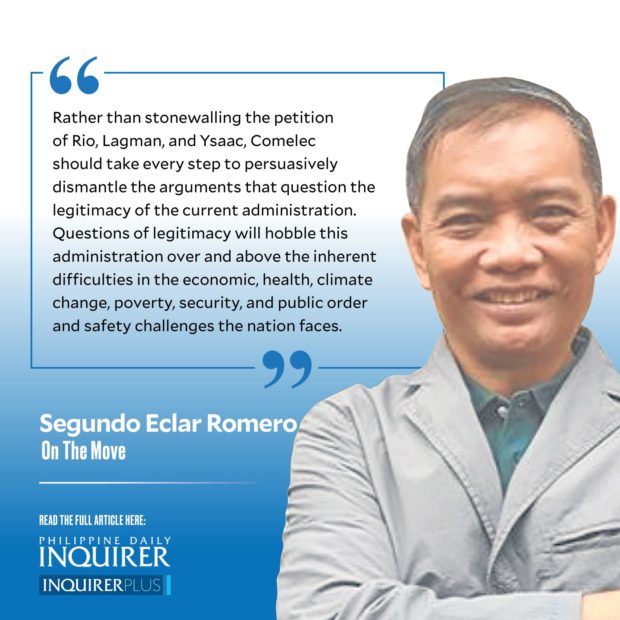There is a petition for the Supreme Court to direct the Commission on Elections (Comelec) and Dito Telecommunity Corp., Globe Telecom Inc., and Smart Communications Inc. that provided the transmission facilities and services in the May 9 elections to preserve the transmission data logs and submit the same to the court. This action aims to preserve the possibility of resolving the question nagging the petitioners. They doubted the Comelec Transparency Media Server could have reported 20 million votes by 8:02 p.m. on election day, considering electoral boards needed about 30 minutes to print eight copies of the election returns prior to transmission.
This controversy points to a lamentable gross mishandling of this issue by the Comelec. The demand for transparency and accountability from Comelec and the telcos on the incredible speed with which votes were transmitted during the first hour after precincts closed is almost like a convenient straw man that could have easily been disposed of by the Comelec. How difficult is it to satisfy the curiosity and concern of a large segment of the public about this issue? Comelec apparently has closed its May 9 experience happy, as they report that they have transmitted faster and more votes than in previous elections because of better equipment and manpower.
The Rio, Lagman, and Ysaac petition is like a gift to the Filipino nation that provides the opportunity to regain some of the serious loss of trust and confidence in the electoral system that hangs in the air after the May 9 elections. Despite the overwhelming votes received by Ferdinand Marcos Jr. over Leni Robredo, the intense dynamics of electoral contestation marred by vote-buying, violence, and irregularities are a continuing silent drag on the organization and mobilization of political energy at various levels and components of the political system.
There were two international observer missions that were fielded across the country to mirror to us Filipinos how our elections went. The Asian Network for Free Elections (Anfrel) gave the less critical report, saying it deems the transmission of preliminary results to Comelec’s transparency server to be timely and seemingly representative of the will of the Filipino people. But it raised concerns about the trustworthiness of the results because of the failure of voting machines in greater numbers than in the 2016 and 2019 elections.
Why should Comelec address these concerns? Anfrel draws from its rich experience in elections in the region in pointing out that “automating parts of the election process comes with a great impetus of transparency and reliability. Any failure to deliver these will surely damage the perception of the process among voters and stakeholders, and result in protests and calls for actions like those we have seen since Election Day. COMELEC can and should do better to establish a relationship of trust with voters.”
The International Observer Mission (IOM) reported that the election “did not meet the standard of free and fair [election] because of these prevailing conditions that robbed the voters of access to reliable information, access to the voting places without intimidation, and a credible vote counting system.”
As to the automated election system, the IOM Final Report said that these elections “were marred by a higher level of failure of the electronic voting system than ever before, along with a higher level of blatant vote-buying, disturbing level of red-tagging and a number of incidents of deadly violence. A large number of voters did not get to cast their vote, and many had to trust that election officials would later put their marked ballot paper through a Vote Counting Machine (VCM), thus undermining the secrecy of the vote.”
To what extent do these reports resonate with large segments of the electorate who observed the same elections, warts and all? What is the point of inviting international observer teams if we will not value and vet their reports for those findings and recommendations that can strengthen our electoral system?
Rather than stonewalling the petition of Rio, Lagman, and Ysaac, Comelec should take every step to persuasively dismantle the arguments that question the legitimacy of the current administration. Questions of legitimacy will hobble this administration over and above the inherent difficulties in the economic, health, climate change, poverty, security, and public order and safety challenges the nation faces.
doyromero@gmail.com
